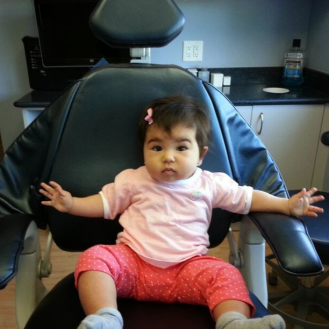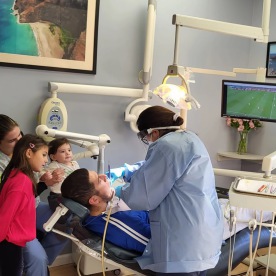When should a child first see the dentist?
Dr Estafan describes the best way to bring a child to the dentist office - so that instead of fearing the dentist - they always enjoy trips to the dentist.
When should a child first see a dentist?
The American Academy of Pediatric Dentistry recommends that a child should first see a dentist when their first tooth appears, or no later than their first birthday. This early dental visit is important for several reasons:
To establish a dental home: An early dental visit establishes a relationship between the child, parent, and dentist, which helps ensure the child's ongoing oral health.
Dr Estafan advises parents to bring the infant to a well-visit appointment for one of the parents (i.e. when the infant is not the patient). This helps introduce the young one to the office in a way that is more subtle. They can meet Dr Estafan, Candice, Melissa and Nikki in passing and see that the office is a friendly place that is part of a regular routine. Imagine an infant or toddler has never been to a dental office - and they have a toothache. Now they are coming to a new place, with all sorts of foreign sounds and smells. It can be a terrifying experience, even if the dental office is quite pleasant. Children benefit from routine. When a child returns to a place and they remember smiling faces and kind people, they are much more likely to willingly participate.
Don’t underestimate how beneficial this well-visit tag-along can be. Imagine thinking the dentist office is a pleasant place. Just think of how foreign that sounds. As a new parent, you have the power to set the stage so that your little loved one can experience just that. And they can keep that mindset for their dental care for life. Regular dental care means keeping your pearly whites healthy so they can last a lifetime.
To prevent dental problems: Early dental visits can help identify and prevent dental problems such as tooth decay, which is one of the most common chronic diseases in children.
To educate parents: Early dental visits provide an opportunity for parents to learn about proper oral hygiene for their child, including brushing, flossing, and diet.
To monitor growth and development: Dental visits allow the dentist to monitor the child's oral growth and development and identify any issues that may require intervention.
In summary, it is recommended that a child should first see a dentist when their first tooth appears, or no later than their first birthday, to establish a dental home, prevent dental problems, educate parents, and monitor growth and development.
Is it OK to put a baby to bed with the bottle?
No, it is not recommended to put a baby to bed with a bottle. This practice, also known as "bottle-feeding to sleep," can have negative consequences for a baby's oral health and overall well-being.
When a baby falls asleep with a bottle in their mouth, the milk or formula can pool around their teeth and gums, which can lead to tooth decay and other oral health issues. Additionally, this can lead to the baby developing a dependency on the bottle to fall asleep, which can make it difficult for them to learn how to self-soothe and fall asleep on their own.
Instead of putting a baby to bed with a bottle, it is recommended to feed the baby before bed and then remove the bottle before they fall asleep. If the baby needs comfort to fall asleep, try other soothing methods such as rocking or singing to them. It is also important to ensure that the baby's teeth are cleaned and cared for regularly to prevent tooth decay and other oral health issues.
What is nursing bottle decay?
Nursing bottle decay, also known as baby bottle tooth decay or early childhood caries, is a condition that affects the teeth of infants and young children. It is caused by frequent and prolonged exposure of the teeth to liquids containing sugar, such as milk, formula, fruit juice, and other sweetened drinks.
When a baby or young child drinks from a bottle or sippy cup filled with sugary liquids and falls asleep with the liquid in their mouth, the sugar can combine with bacteria in the mouth to form acid. This acid can then erode the enamel on the teeth, leading to cavities and tooth decay.
Nursing bottle decay typically affects the upper front teeth, but it can also affect other teeth in the mouth. Signs of nursing bottle decay include brown or black spots on the teeth, sensitivity to hot and cold temperatures, and pain or discomfort when eating or drinking.
To prevent nursing bottle decay, it is important to:
- Avoid putting a baby to bed with a bottle filled with sugary liquids.
- Clean the baby's teeth and gums regularly with a soft cloth or brush.
- Limit the amount of sugary drinks that a baby or young child consumes.
- Encourage the child to drink from a regular cup as soon as they are able to.
- Schedule regular dental checkups for the child to ensure that their teeth and gums are healthy.
- If left untreated, nursing bottle decay can lead to pain, infection, and even the loss of teeth. Therefore, it is important to take steps to prevent and treat this condition as early as possible.




